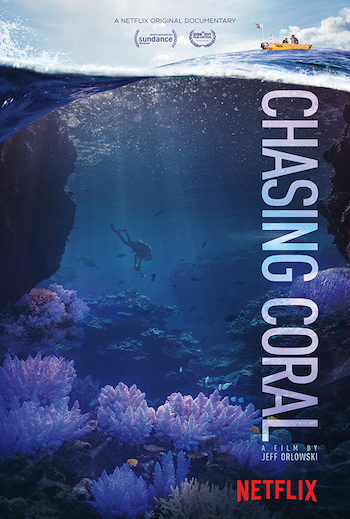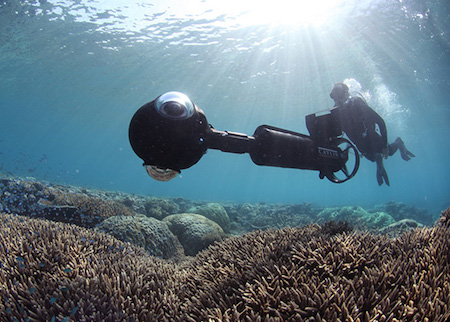Reefs threatened worldwide, scientific film ‘Chasing Coral’ shows in free event April 17
Coral reefs around the world are vanishing at an unprecedented rate. A team of divers, photographers and scientists set out to discover why and to reveal the underwater mystery to the world in the documentary “Chasing Coral.”
 Lamar University’s Department of Biology will present “Chasing Coral” in a free public showing April 17. Hosting the event are Associate Professor Matthew Hoch, and an advisor on the documentary, coral reef biologist and LU biology alumnus Marine Ecologist/Geologist Joanie Kleypas. Lamar faculty and students involved in coral reef research in Belize and elsewhere will join Kleypas in a panel discussion after the film. The event is free and open to the public at 7 p.m. in John Gray Center, Price Auditorium.
Lamar University’s Department of Biology will present “Chasing Coral” in a free public showing April 17. Hosting the event are Associate Professor Matthew Hoch, and an advisor on the documentary, coral reef biologist and LU biology alumnus Marine Ecologist/Geologist Joanie Kleypas. Lamar faculty and students involved in coral reef research in Belize and elsewhere will join Kleypas in a panel discussion after the film. The event is free and open to the public at 7 p.m. in John Gray Center, Price Auditorium.
Joining Kleypus as co-hosts on the panel discussion after the screening will be Hoch; Ana Christensen, associate professor of biology; and Harley Myler, professor and chair of the Phillip M. Drayer Department of Electrical Engineering. Each presenter offers unique perspectives on the health of reef ecosystems through their own research. Christensen’s research includes study of brittle stars on the Australia Great Barrier Reef and the Meso-American Barrier Reef in Belize. Myler’s research interests include the development of submersible robotic vehicles to assess reef biodiversity and invasive species, such as lionfish. Hoch is engaged in the study of the microbiology of algal-coral interactions leading to coral morbidity and mortality in both Belize and French Polynesia, funded by the National Science Foundation. More information on their research can be found at Lamar.edu/chasingcoral.
Chasing Coral is a film directed by Jeff Orlowski and produced by Larissa Rhodes, as an Exposure Labs production. It was filmed over three years, with more than 500 hours spent underwater, and includes footage from more than 30 countries, through the combined efforts of more than 500 people around the world.
As a marine scientist at the National Center for Atmospheric Research (NCAR) in Boulder, Colorado, Kleypas investigates how rising atmospheric carbon dioxide is affecting marine ecosystems. She was one of the first scientists to illustrate the potential impacts of ocean acidification on marine calcifiers. She uses a combination of data analysis and modeling to understand coral reef response to climate change, with an emphasis on identifying solutions to the coral reef crisis. She recently founded an underwater coral nursery and reef restoration program in Central America.
 Kleypas earned a Bachelor of Science degree in marine biology from Lamar University, a Master of Science degree in marine science from the University of South Carolina, and Ph.D. from James Cook University, as a Fulbright scholar to Australia, where she conducted research on the Great Barrier Reef. She has testified multiple times to the U.S. Congress on the topic of marine ecosystems and climate change. She is an Aldo Leopold Leadership Fellow, and has given numerous educational and public talks on coral reefs and climate change; she was the 2009 recipient of AGU’s Rachel Carson Award as well as the 2011 recipient of the prestigious Heinz Award.
Kleypas earned a Bachelor of Science degree in marine biology from Lamar University, a Master of Science degree in marine science from the University of South Carolina, and Ph.D. from James Cook University, as a Fulbright scholar to Australia, where she conducted research on the Great Barrier Reef. She has testified multiple times to the U.S. Congress on the topic of marine ecosystems and climate change. She is an Aldo Leopold Leadership Fellow, and has given numerous educational and public talks on coral reefs and climate change; she was the 2009 recipient of AGU’s Rachel Carson Award as well as the 2011 recipient of the prestigious Heinz Award.
Financial support for the event is provided by LU’s College of Arts and Sciences, College of Engineering, and Office of Sustainability. In-kind LU student organization sponsors are the TriBeta National Biological Honors Society - Delta Omicron Chapter and the LU Green Squad.
About the Film
Coral reefs are the nursery for all life in the oceans, a remarkable ecosystem that sustains us. Yet with carbon emissions warming the seas, a phenomenon called “coral bleaching”—that often results in mass coral death—has been accelerating around the world, and the public has no idea of the scale or implication of the catastrophe silently raging underwater.
Enter Jeff Orlowski, director of Chasing Ice, which created irrefutable, visual proof of the melting ice caps. Orlowski’s next project is similarly evidentiary and powerful. Chasing Coral taps into the collective will and wisdom of an ad man, a self-proclaimed coral nerd, top-notch camera designers, and renowned marine biologists as they invent the first time-lapse camera to record bleaching events as they happen. Unfortunately, the effort is anything but simple, and the team doggedly battles technical malfunctions and the force of nature in pursuit of their golden fleece: documenting the indisputable and tragic transformation below the waves. With its breathtaking photography, nail-biting suspense, and startling emotion, Chasing Coral is a dramatic revelation that won’t have audiences sitting idle for long.


